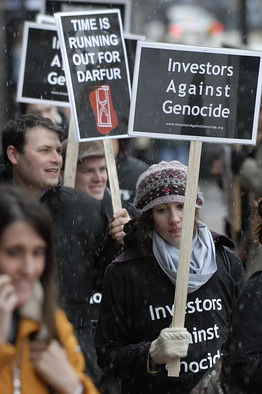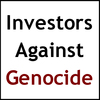Anti-Genocide Shareholder Proposal Earns up to 25% of Votes at Fidelity
Second year of strong support despite Fidelity’s active opposition "stacking the deck against the proposal"
Published 07-16-09
Submitted by Investors Against Genocide
 Miranda Cohen, of Lexington, Mass., center, pickets with the group Investor Against Genocide outside a Fidelity Investments shareholders meeting in Boston, Wednesday, March 19, 2008. Photo provided by AP
Miranda Cohen, of Lexington, Mass., center, pickets with the group Investor Against Genocide outside a Fidelity Investments shareholders meeting in Boston, Wednesday, March 19, 2008. Photo provided by APBoston, MA - July 16, 2009 - At today's Fidelity shareholders meeting, results were announced on votes cast by millions of Fidelity customers on adopting a policy to prevent Fidelity from investing their savings in companies that substantially contribute to genocide or crimes against humanity. By voting "FOR" ballot Question 3, shareholders asked the fund's Board to "institute procedures to prevent holding investments in companies that, in the judgment of the Board, substantially contribute to genocide or crimes against humanity, the most egregious violations of human rights." Despite Fidelity's active opposition, affirmative votes were recorded for four funds, ranging between 18% and 25%. Nine additional funds did not reach quorum on Question 3 and were adjourned to meet again August 14, 2009.
"Last year, some two million shareholders of record voted FOR the proposal, despite Fidelity's active opposition," states Eric Cohen, Chairperson of Investors Against Genocide, the Boston-based non-profit organization responsible for the anti-genocide shareholder action at Fidelity and other mutual fund companies. "Again this year, huge numbers of Fidelity customers voted FOR the proposal," says Cohen. "Fidelity has insisted on retaining its flexibility to invest in genocide, disregarded the voice of its customers, and, in the process, alienated millions of its customers who rejected its amoral guidance."
During voting last year, Investors Against Genocide repeatedly asked Fidelity to take a neutral position on the proposal so that the voting results would give a better indication of the opinion of Fidelity’s customers. "Despite Fidelity's claims last year that it wanted to learn what its customers thought about the proposal, Fidelity chose to once again actively oppose it, stacking the deck against the proposal and skewing the results," says Cohen. "One can only imagine how much larger the number of affirmative votes would be if more ordinary investors took the opportunity to vote, rather than discarding their proxy materials, as is common practice."
Several factors should be considered in analyzing the numeric results of votes at this shareholder's meeting. Since the genocide-free investing proposal is the first shareholder proposal ever in Fidelity's history, Fidelity's customers are not accustomed to voting on an issue opposed by management. Shareholders frequently do not vote at all assuming that the ballot questions are simply procedural. Those shareholders that do vote frequently check off the box that indicates that they vote according to all management recommendations without reading each question. Since Fidelity opposed Questions 3, rather than remained neutral, those people's votes would be a considered an "AGAINST" vote even though they never read the entire ballot. Lastly, large numbers of institutional shareholders vote with management and broker non-votes and abstentions at Fidelity are counted as if they were votes against the proposal. "Unlike a political election, where the will and sentiment of the people is easily discernible, the shareholder voting process is heavily weighted in the mutual fund company’s favor," said Cohen.
The Fidelity funds recording votes today were Fidelity Asset Manager 50% at 21.7% FOR the proposal, Fidelity Asset Manager 70% at 24.6%, Fidelity Investment Grade Bond Fund at 18.1% and Fidelity Cash Reserves at 19.3%. Results of the voting today were comparable to results on the same proposal at Fidelity last year, when 14 funds recorded votes ranging from 20% to 31% FOR the proposal.
A 2007 study by KRC Research demonstrated that Americans are overwhelmingly opposed to being financially connected to genocide. In the study, 71% of respondents said companies should take extreme cases of human rights abuses, such as genocide, into account rather than base investment decisions solely on economic criteria. In that same study, 77% said they would switch to a different investment company if they learned that those managing their funds had significant investments in firms that were active in Sudan. "By refusing to avoid the very small number of companies that help support the genocide in Darfur, Fidelity is out of touch with the American people," says Cohen.
Reflecting the broad public support against investing in genocide, both Houses of Congress unanimously passed the Sudan Accountability and Divestment Act (SADA). Signed into law by President Bush on December 31, 2007, SADA provides explicit support for fiduciaries to divest from Sudan. Additionally 27 states and 61 colleges and universities have divested from targeted companies with ties to the Sudanese government.
Fidelity's lack of accountability stands in stark contrast to the recent, clear, public statements by TIAA-CREF to take strong action against problem companies. On March 26, TIAA-CREF announced its decision to vigorously engage problem companies partnering with the Government of Sudan and to divest from those companies if they continue to substantially contribute to genocide or crimes against humanity. TIAA-CREF's policy applies to the ongoing genocide in Darfur, Sudan as well as to future genocides. This policy at TIAA-CREF is a clear victory for the cause of genocide-free investing.
As a result of this significant commitment from TIAA-CREF, Investors Against Genocide withdrew its shareholder proposal from the proxy ballot for TIAA-CREF's July shareholders meeting.
In September 2008, the Congressional Human Rights Caucus held a briefing on genocide-free investing focusing on the problem of US financial institutions making large investments in genocide. Plans are underway for formal Congressional committee hearings on genocide-free investing in 2009.
Hundreds of thousands have been killed and 3.0 million have been driven from their homes in Darfur. This humanitarian crisis has been labeled by the US government as the first genocide of the 21st century. The government of Sudan has continued to pursue genocide in Darfur for over six years, using as much as 70% of its oil revenue to provide arms and funding for the genocide, rather than economic development for the poor people of Sudan. Although federal law prevents most US companies from operating in Sudan, American financial institutions, notably mutual fund companies, are major investors in the Chinese, Indian, and Malaysian oil companies involved in Sudan that are helping to fund this genocide. As a result, ordinary investors, through their mutual funds, family savings, and pension plans entrusted to these financial institutions are inadvertently investing in genocide.
Investors Against Genocide is a non-profit organization dedicated to convincing mutual fund and other investment firms to change their investing strategy so as to avoid complicity in genocide. The organization works with individuals, companies, organizations, financial institutions, the press, and government agencies to build awareness and to create financial, public relations, and regulatory pressure for investment firms to change. The ultimate goals are that the Government of Sudan ends its deadly genocide in Darfur and that investment firms avoid investing in genocide. For more information, visit www.investorsagainstgenocide.org.

Investors Against Genocide
Investors Against Genocide
Investors Against Genocide is a non-profit organization dedicated to convincing mutual fund and other investment firms to change their investing strategy so as to avoid complicity in genocide. In particular, we want investment firms to avoid or divest holdings of PetroChina (Chinese), Sinopec (Chinese), ONGC (Indian), and Petronas (Malaysian), the four major oil companies that are partnering with the Government of Sudan and helping to fund the genocide in Darfur. The campaign works with individuals, companies, organizations, financial institutions, the press, investment firm employees, and government agencies to build awareness and to create financial, public relations, and regulatory pressure for investment firms to change. The ultimate goals are that investment firms adopt at least the most basic ethical investment policies, that the Government of Sudan ends its deadly genocide in Darfur, and investment firms avoid investing in genocide in the future.
More from Investors Against Genocide

